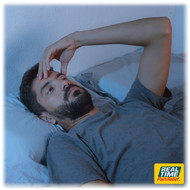Pain and Sleep Troubles: 5 Tips for Relief
17th Nov 2021
Dealing with pain and sleep troubles? Here is a look at the correlation between the two issues, as well as 5 alternatives to get relief without taking sleep medication!
Are You Getting Enough Sleep?
Getting enough sleep is vital for your overall health. Yet, most of us fall short when it comes to getting enough shuteye. If you don’t get quality sleep, you’re not alone. According to the National Sleep Foundation, about 35 percent of adults describe their sleep as fair or poor.
Sleep can affect all areas of your health from your risk of disease to your mood. It can also play a role in chronic pain, including your level of pain and how well you cope. But if you have issues with pain, there are several things you can do to improve the quality of your sleep
The Correlation Between Pain and Sleep Troubles
Lack of sleep might include trouble falling or staying asleep, which decreases the total hours of rest you get. Whatever the sleep issue you have, it can have several effects on your health, including:
- Memory problems
- Trouble concentrating
- Weight gain
- Depression
- Irritability
The Price of Poor Sleep
Not only can sleep lead to the issues listed above, but it may also play a role in pain. Sleep problems and pain often go hand-in-hand. If you have pain, it can make it difficult to fall and stay asleep. But that’s not all. Poor sleep may also make the pain worse. Whether you have frequent back pain, muscle soreness, or arthritis, lack of sleep can increase your pain.
According to the Institute for Chronic Pain, lack of sleep stresses the nervous system, which makes it more reactive. When the nervous system is more reactive, it can interpret pain signals differently, amplifying the pain.
Lack of sleep is also associated with flare-ups of chronic pain. In research published in The Journal of Pain, problems with sleep reliably predicted exacerbations of chronic pain and new incidents of pain.
But lack of sleep or poor sleep may not only increase pain, it can also make it more difficult to deal with. When you don’t get enough sleep, it can make you more susceptible to frustration and irritability. The bottom line is when we are tired, we do not cope as well with problems, including pain.
5 Tips for a Better Night's Rest
Some people turn to sleep medications, including over-the-counter drugs or prescription meds to help them fall asleep. But sleep medications can have several side effects, which creates a new set of problems. Instead, consider following these 5 tips for a better night's rest.
#1) Use a Topical Melatonin Lotion
Using a pain relief lotion infused with topical melatonin is an excellent alternative to oral melatonin. Melatonin is a naturally occurring hormone that regulates your sleep. But various factors affect how much melatonin you produce, which is why some people take it in supplement form. Using a pain relief lotion with topical melatonin can provide the benefits of pain relief and promote sleep possibly better than oral melatonin.
Research published in the Journal of Clinical Pharmacology and Therapeutics studied the use of topical melatonin to help shift workers and people with jet lag. The results indicated that topical melatonin delivery might be more effective at promoting sleep than oral melatonin.
#2) Stick to a Consistent Sleep/Wake Schedule
It’s helpful to go to bed and wake at about the same time each day to develop a natural rhythm. If you go to bed and wake at different times each day, it interferes with your body’s ability to develop a sleep schedule. So, even if you want to sleep in, try to stick to the same schedule even on weekends.
#3) Reduce Sleep Stealers
Several things you do every day could be affecting your sleep. Reducing sleep stealers can help you fall asleep easier. For example, cut caffeinated beverages several hours before bed. Put down your laptop or phone a few hours before you hit the sack. The light from the devices can make your brain think it is daytime and inhibit melatonin production. Also, don’t nap too long during the day, or you may find it difficult to fall asleep at night.
#4) Apply a Topical Pain Relief Lotion
Another great option to decrease pain and promote sleep is a topical pain relief lotion with ingredients like menthol or arnica. A topical relief lotion will help reduce stiffness, pain, and inflammation without the side effects of pain medications. Decreased pain means you can get to sleep easier and won’t wake up groggy as you might from sleep meds. Look for lotions that contain soothing ingredients, including capsicum, magnesium, glucosamine, and lavender.
#5) Make Your Bedroom Sleep-Friendly
Creating the right environment promotes quality sleep. Most people sleep more sound in a dark and quiet room. Set a temperature that is comfortable for you. If you live near a busy street or in an apartment complex, consider buying a sound machine that blocks outside noises. Use blinds or black-out curtains to prevent the sun from peeking through early in the morning.
By using the tips above, you can naturally decrease pain and increase sleep. Getting enough shuteye may reduce pain and improve your overall health.
Pain Relief You Can Trust® Since 1998
For over 20 years, families across the U.S. have turned to Real Time’s lotions and creams for PAIN RELIEF YOU CAN TRUST®. From Lifestyle Essentials, through our Nujuvena line, to Pain Relief Formulas, Real Time has you covered. LEARN MORE
Sources
- https://www.ncbi.nlm.nih.gov/pmc/articles/PMC4046588/
- https://www.ncbi.nlm.nih.gov/pmc/articles/PMC2909186/
- http://www.instituteforchronicpain.org/understanding-chronic-pain/complications/sleep-disturbance
- https://www.sleepfoundation.org/press-release/lack-sleep-affecting-americans-finds-national-sleep-foundation





